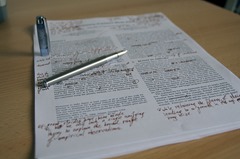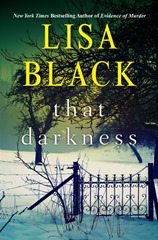Today I welcome back to TKZ my friend and fellow ITW member, Lisa Black. I’ve asked Lisa to share her writing techniques with us. Enjoy! – Joe Moore
————————————–
 I don’t know why we never get tired of hearing about another author’s writing habits, whether we’re looking for that one trick that will make our lives so much easier, or if it’s the voyeuristic thrill of seeing how someone else washes their dishes or packs their suitcase (“You do what? Seriously?”)
I don’t know why we never get tired of hearing about another author’s writing habits, whether we’re looking for that one trick that will make our lives so much easier, or if it’s the voyeuristic thrill of seeing how someone else washes their dishes or packs their suitcase (“You do what? Seriously?”)
At any rate, here is mine:
I am a plotter, not a pantser, so before I start writing at all I have to know how the book begins, how it ends, and the major incidents which will take place. These points begin as amorphous thoughts rattling around in my skull for a day or a few years or a lifetime. I write a series, thus my character tends to be the same—a female forensic scientist in Cleveland, Ohio—so the rest of the book might stem from a new character, a puzzle, an incident or, in one case, simply a snarky comment I wanted my character to make. Most often I start with a building, something visual and brooding and a little intimidating—a skyscraper under construction, a wind-swept observation deck, the opulent and historic Federal Reserve building.
Then a theme: what am I going to be talking about? What new world is my character going to explore? I’ll research, looking for ideas, and come up with things I want to have happen. Then I have to think of links that tie those things together, what carries my character from one to the next.
Eventually I’ll have enough for an outline. It won’t look like an outline, more like a freestyle poem.
This happens
Then this happens
Then this happens and my heroine really doesn’t like it
Then this happens
Etc.
And penciled in between the second and third line will be scribbled addendums such as “oh wait, this happens too.”
Then I’m ready to start writing.
I have always been obsessed with word count, so I set a daily goal—whatever works for you, whether it’s 100 words or 3,000. You’ll feel a sense of accomplishment each day without overtaxing yourself. I’ve done 1,000 words/day, 2,000 words/day 5 days/week, lately I’ve been doing 1000 words/day on the days I work and 2,000 words/day on the days I don’t. I used to write the total down every day so I knew how far I had to write the next day, but for the past few books I’ve made it easy on myself and kept it at a round number. If I write extra on one day, that’s a few less words I have to write on the next. I don’t rewrite until I’m completely done, except for minor fixes or things that I’m afraid I won’t remember if I don’t do them right away. Then I keep going until I have a full length completed first draft, minus vacations and major holidays…I’m not a total slave driver.
(I never take writing on vacation with me. I won’t want to do it, won’t do it, and then feel guilty all week because I’m not doing it. If I don’t take it along, conflict resolved.)
A schedule may not work for you, but unless your system totally rebels, I strongly suggest it. The most important factor is that writing becomes, like death, taxes and aerobics class, not optional. There are authors who write when inspiration strikes, who will then hole themselves up in their room and write for 16 hour days, but they seem to be the minority.
Since I started out writing at (she whispered) work, I’m not fussy about where or when I write. I prefer to write at home when my husband is at work and the house is quiet, but the disadvantage to writing at home is that there are so many opportunities for procrastination—laundry, bill paying, the newspaper, chocolate…. Sometimes it’s better to have laptop and will travel. I have written in restaurants, witness waiting rooms at the courthouse, next to a sleeping hospice patient while the caregiver gets a few hours off, and, of course (she whispered) at work.
When I finish the first draft, I take myself out to lunch and take a few days off before starting the second draft. According to industry wisdom I should put it in a drawer for six months and then rewrite, but who has that kind of time? When that is done I’ll send it to my sisters to read, and then do a third draft before sending it to my agent and biting my nails lest she say “This stinks. Throw it out and write something else.” Which has happened.
 By this point I’m sick to death of the thing and never want to see it again, but have to deal with whatever changes my agent suggests, and then, when I’m really sick of it and provided she doesn’t say ‘throw it out’, I go through the same kind of round with my editor.
By this point I’m sick to death of the thing and never want to see it again, but have to deal with whatever changes my agent suggests, and then, when I’m really sick of it and provided she doesn’t say ‘throw it out’, I go through the same kind of round with my editor.
When I’m not writing a book, I don’t write—other than personal letters, which I send out constantly and obsessively (my friends and relatives know much more about the minutia of my life than they care to). I don’t write short stories or blog posts or novellas. I wish I did, but my brain just doesn’t work like that. At this moment I haven’t written a thing in nine months and it’s starting to freak me out.
That’s my system. It seems to work for me. If it sounds great to you feel free to adopt it. If it sounds bizarre than keep doing whatever you’re doing. There are as many different writing styles as there are writers.
And that’s a good thing.
 Please share your writing method with us.
Please share your writing method with us.
Lisa Black has spent over 20 years in forensic science, first at the coroner’s office in Cleveland Ohio and now as a certified latent print examiner and CSI at a Florida police dept. Her books have been translated into 6 languages, one reached the NYT Bestseller’s List and one has been optioned for film and a possible TV series.

Welcome to TKZ, Lisa…again. Wow. Over 20 years in forensics. That is fascinating to me. I’m an addict for forensic shows on TV.
I’d love to hear about your current CSI job in Florida.
What’s your favorite part of the job?
What’s your least favorite aspect?
My own writing method starts with a vague plot overview (my “W” diagram) where I form 7 key story turning points that will drive the plot. This allows me enough info (or framework) to write a synopsis that will be my guidepost. I think of this as my hybrid plotting method, something outline-ish enough to not stifle my inner pantser.
Like you I have a daily word count general goal 1500-5000/words day, depending on project. Where we most differ is how I edit. I have a rolling edit process where I edit as I write forward. I don’t work in drafts. When I’m done, I usually make one last pass through as a reader, before I send to my beta readers. Then I find myself jonesing for the next project. I write full time so I don’t have to balance my other work life as I did for years when I worked in the energy industry.
Like Jordan, I’d love hear more about your day job. *hint hint*
My writing is similar. I have an Excel spreadsheet based on Larry Brooks’ structure in Story Engineering, with JSB’s milestones thrown in for good measure. Once I have my basic structure in place, I fill in the gaps with a quick line for the mission of each scene. But I do allow myself plenty of wiggle room in case a better idea comes along. And stacks of index cards with notes scribbled on them (it ain’t pretty, but it works for me). I begin each day with editing the previous day’s work. It helps me get back into the groove. Then a final pass or two of edits before sending to my CP, then to my editor. I write full-time, so thankfully, I don’t have to juggle like you do.
Now, let’s get back to your fascinating career in forensics… I’m taking a few courses in forensic science and forensic psychology, and I’m hooked!
At this moment I haven’t written a thing in nine months and it’s starting to freak me out.
Lisa, I freak out after two days. Of course, you are in the nice position of having a job you like and are good at, while writing bestsellers on the side. Very cool.
I like your structured approach. When I finish a draft I put it aside for at least three weeks (not six months!) then print out a hard copy with a cover mock up (complete with enthusiastic blurb) then read it as much like a reader as possible, taking minimal notes. When that’s done, I ask the big questions first (stakes, flow, characters) then do my re-write. I don’t face structural challenges because that’s been taken care of in the pre-planning.
Thanks for stopping by, Lisa. When I was a whelp I enjoyed the show It Takes a Thief, starring Robert Wagner. I think it was on that show that he scraped a pencil on sandpaper, blew the residue onto a glass, then put tape on the glass to capture the fingerprint. I thought that was quite cool. Would it work?
Lisa illustrates the importance of understanding your own psychology to spur yourself on. By not writing while on vacation, she builds up enough guilt to motivate herself once she’s back at work.
As Arnold Schwarzenegger advised young bodybuilders, “Stay hungry.” Good advice for writers, too.
Thanks for stopping by, Lisa. I too would love to hear more about your job.
One of my fond memories is meeting a retired coroner for Hillsborough County while sunbathing at a nudist resort north of Tampa. We had many great conversations and he helped me plot a murder for a short story that was later published. Since my husband slept late and wasn’t present for some of our discussions, I’m sure other folks at the pool thought the coroner and I were plotting his murder 🙂 But, no, he’s still alive and kicking. And I gathered terrific material for future projects.
Thanks for sharing your process, Lisa. I’m confident your words provide reassurance to many writers. I’m like you on the inability to leave the first draft alone for a month or two, a la Stephen King. Throughout the entire first draft I’m constantly adding to a “Revision Notes” document, so I take off a little time at the end of the draft but I’m ready to roll pretty soon. Right now about four-fifths the way through my third novel, I already have 83 different revision notes on that document.
Wow, what can I tell you about working in forensics…my favorite part of the job is that it’s different and I feel it’s what I should be doing. I don’t know how else to put it. When I was a personnel secretary, a perfectly good job, I did NOT feel that that was what I should be doing. What I like the best about it, truly, is when I can contribute something that really makes a difference to the investigation–a fingerprint hit, picking up a swab of blood, finding the bullet casing we’ve been looking for.
The least favorite part is getting called out in the middle of the night, especially for something minor like to collect a video that could have easily waited until morning!
Lisa Black,
The police need those videos right away! Don’t you watch “See No Evil” on the Investigation Discovery channel? That’s where I get my information.
I loved It Takes A Thief too. Robert Wagner was almost as cool as Robert Conrad in The Wild Wild West. Almost.
Yes, the pencil on the sandpaper should work–black powder is simply highly refined carbon dust, and the pencil lead is carbon. I wouldn’t want to have to use that because it wouldn’t be as fine, but in a pinch it could work.
People alwayas think I’m planning my husband’s murder, Debbie! But he’s still alive too. Though not for long if he keeps buying ridiculously expensive automobiles….!
You guys are scaring me a little bit though…you all sound WAY more organized than I am!
🙂 I figure cars are a better vice than women, booze, or gambling.
Just ordered That Darkness on my Kindle. The teaser on Amazon hooked me.
Wow!! What stories you could write while working in forensics!
Let me just re-adjust my jaw a little bit from its hanging position, lol. I just want to pick your brain and hang out with you for a week–maybe a month. I’ve been wanting to dive more into mystery and suspense for my stories. Honestly, I haven’t had the guts to do it because of lack of knowledge in this very area. There is only so much you can Google…
Any suggestions for those attempting to write using forensics and how to keep it current, original, real, etc.?
Sure…see if your local police department has a ‘citizen’s academy’ program you could attend. Or see if you could audit a few forensic classes at your local college!
Welcome back to the Zone, Lisa! You give Important advice about making one’s writing schedule “not optional.” Otherwise, nine months without writing turns into 19 in the blink of an eye.
Welcome back Lisa! Like you I’m a plotter so I spend a lot of time mulling over how the book with progress and correcting course once I get into it. I have lots of revised outlines…Like Kathryn I love the writing schedule being ‘not-optional’ – half the battle is just putting the bum not he seat and fingers on the keyboard:)